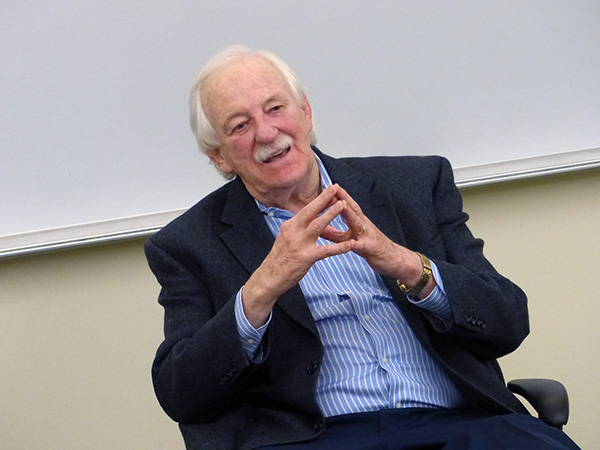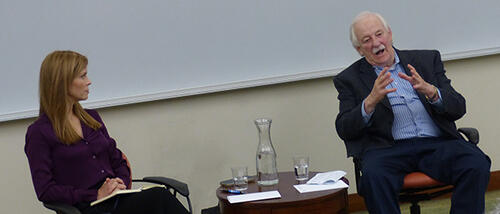Former U.S. Rep. Bruce Morrison: How to Approach Immigration Reform

Former U.S. Rep. Bruce Morrison (D-New Haven) led the writing and passage of the Immigration Act of 1990, one of only two major immigration bills in American history to increase legal immigration.
At the Institution for Social and Policy Studies last month, he drew on his experience and knowledge of Congress to describe how to overcome the current inability to produce new legislation addressing who can come to the United States and what to do with the millions of unauthorized people who are already here.
“We really need to start small, start with things that everybody agrees aren’t working,” Morrison said. “Nothing builds confidence in the legislative arena more than success.”
The event was co-sponsored by the Yale Jackson School of Global Affairs and moderated by Bonnie Weir, a senior lecturer in global affairs, assistant dean for undergraduate education at the Jackson School, and founding co-director of the Program on Peace and Development at Yale University.
“It was a tremendous pleasure to bring one of the great reformers of immigration law to ISPS,” Weir said. “We must learn from the successes of the past if we are to navigate the current political environment and build a future for this country in which all parties are heard and everyone can contribute and feel welcome.”
Morrison described the 1990 bill as the second half of a reform project begun with a 1986 law signed by President Ronald Reagan, which created civil and criminal penalties for employers who knowingly hired unauthorized immigrants and provided legal status for about 3 million people who had arrived in the country before 1982.
“I like to describe what happened in the 1980s as the reaching of a national consensus,” he said. “Update laws and make decisions about how people would get to come. And then when people came, they were immigrants, permanent residents, on the path to citizenship, with all the rights as Americans. They were joining our community. They weren’t outsiders. They weren’t just workers. They were also whole people.”
Morrison said that consensus quickly broke down in the 1990s and needs to be rebuilt, noting that most people accept the regular flow of large numbers of immigrants but reject what they feel is chaos, particularly at the southern border and regarding the many years it can take to resolve asylum and removal cases.
“I think it is one of the jobs of government to assure people we are on top of our responsibilities and are not allowing chaos to govern,” he said. “Have a plan and implement the plan. We can fight over the details of the plan. But we need to have a plan.”
In 2000, Morrison established the Morrison Public Affairs Group (MPAG) to provide strategy and support for immigration reform advocated by trade associations, professional organizations, and grassroots groups. ISPS Director Alan Gerber expressed his gratitude to Morrison, Yale Law ’73, for sharing his views with a crowded room of faculty and students.
“It is a rare privilege to hear about immigration from someone like Rep. Morrison, who was directly involved in the most important contemporary legislation and remains engaged with the ongoing challenges in this crucial area,” Gerber said.

Morrison called for Democrats and Republicans to “put away our verbal attack tools” with which they label their opponents as xenophobes or advocates of open borders.
“We can have a conversation about how many people can come comfortably to the United States and how they will contribute,” he said. “But as soon as we reduce our debate to name calling and finger pointing, we’re doomed.”
Morrison suggested starting small, with the unauthorized residents known as “dreamers,” who were brought to the United States as children and have wide public support. He said Democrats should focus on providing a process for dreamers to obtain citizenship and create some provisions to prevent future flows of unauthorized immigrants as a tradeoff.
In addition, Morrison suggested clearing the large backlog of green card applicants and restricting H-1B visas that employers use to sponsor workers but that he said trap those workers into a form of indentured servitude without the possibility of permanent residency outside a relationship with their initial employer.
Morrison said governors need to act collectively to prompt Congressional action, adding that municipalities should be allowed to sponsor immigrants for green cards, helping cities to rebuild themselves.
He said the United States should continue to take in refugees fleeing war and persecution, but that addressing the world’s problems is the province of foreign policy, not immigration. And despite his progressive policies and Democratic allegiance, Morrison acknowledged Republican concerns about the need for some guidelines and limitations on immigration.
“We have very significant problems with poverty and inequality in the United States,” he said. “Does it make sense to bring in impoverished people? Or if we do, how can we make sure they don’t exacerbate inequality in our country? In a democracy, sovereignty is not a bad word. Our citizens have a right to decide which and how many immigrants come here. We also have to address the needs of the people already here.”
Morrison urged President Joe Biden to articulate an actionable plan for managing the Mexican border, including the eradication of human smugglers, who extract huge sums of money from migrants and whose trafficking endangers their lives and the lives of their children.
But most of all, he said, we need to build a consensus like the one that resulted in the 1986 and 1990 legislation.
“It took maybe 200 years to get there,” he said. “But we should not take 200 more years to get to the next one.”